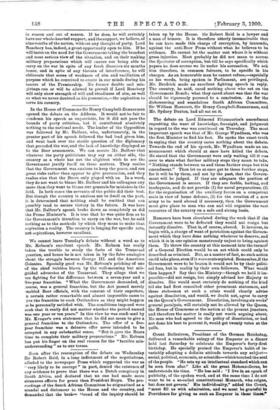In the House of Commons Sir Henry Campbell-Bannerman opened the
debate on the Address. It would not be fair to condemn his speech as unpatriotic, for it did not pass the bounds of party criticism, but it contributed absolutely nothing to the national needs. The leader of the Opposition was followed by Mr. Balfour, who, unfortunately, in the greater part of his speech followed the bad lead given him, and went back over the sterile question of the diplomacy that preceded the war;and the lack of knowledge displayed as to the Boer armaments. We can assure Mr. Balfour that whatever the party politicians may say on either side, the country as a whole has not the slightest wish to see the Government justify itself on these matters. They realise that the Government was anxious to keep the peace, and ran great risks rather than appear to give provocation, and they realise also that the Boers only played with us. In a word, they do not want to blame Mr. Balfour and his colleagues any more than they want to blame our generals for mistakes in the field. In both cases the servants of the public did their best. But though the country is anxious not to dwell on the past, it is determined that nothing shall be omitted that can possibly tend to secure victory in the future. It was here that Mr. Balfour's speech broke down as completely as did the Prime Minister's. It is true that he was quite firm as to the Government's intention to carry on the war, but he said nothing as to the methods by which they mean to make that aspiration a reality. The country is longing for specific acts, not aspirations, however excellent.






































 Previous page
Previous page